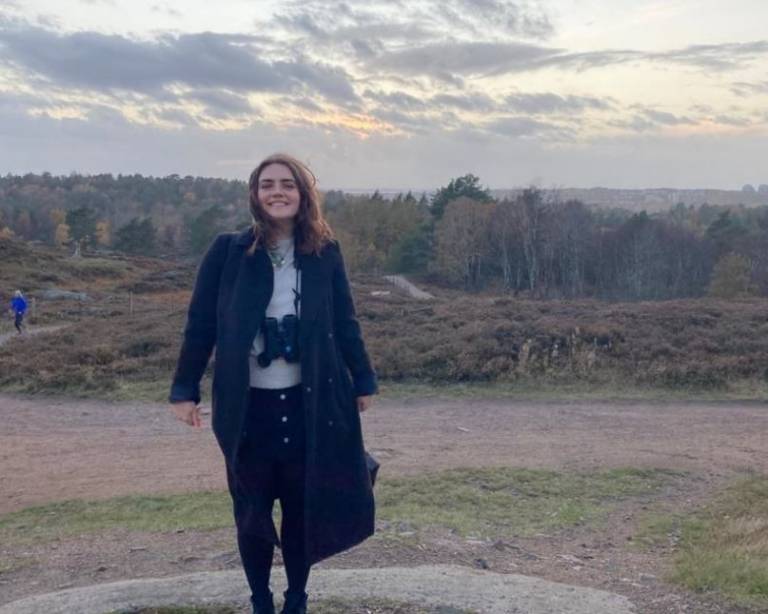Meet UCL’s Wild Bloomsbury Lead: Hannah Biggs
4 May 2021
Hannah Biggs project manages UCL’s Wild Bloomsbury Project. We spoke to her about nature and its role in improving mental health, and how UCL is increasing biodiversity across campus.

Hannah is leading on UCL’s commitment of enhancing biodiversity on campus by 10,000sq meters by 2024. She is also working on embedding sustainability into UCL’s curriculum and supporting the planning of UCL’s Climate Campaign in the run up to COP 26. Hannah was named a ’30 under 30’ sustainability leader by edie in 2020 for her dedication to sustainability at UCL.
Can you tell us about nature and its role in improving mental health?
Absolutely, nature is a fantastic resource for both our mental and physical health, I don’t think this has ever been more paramount! If you are lucky enough to be close to, or have access to a park, garden, green space, or river, this can vastly improve your mood, reduce stress and anxiety. I notice I significantly feel calmer just from watching the birds outside my window, choosing to walk through a park instead of a busy main road or sitting by water for lunch. Likewise, growing food, herbs or flowers from seed or providing treats for the birds, can also be a relaxing activity, and something you can enjoy with children, friends, or a community group. Whether on wheels or foot, being in the outdoors can lift your heart rate and get you moving whilst studying or working from home. But even taking quiet time to reflect on our natural surroundings can be positive for mental health. Lastly having strong, healthy, and supportive relationships with those around us is important for wellbeing, green spaces are perfect places for people to meet, play sport and socialise with others.
What is UCL’s Wild Bloomsbury campaign, and why was it developed?
UCL research shows that bringing nature into urban environments can improve wellbeing, increase climate-resilience, and improve air quality. The Wild Bloomsbury campaign seeks to collaborate with students, staff, researchers, and the local community to demonstrate that nature-based solutions can create a vibrant and liveable Bloomsbury for people and planet. We’ve committed to creating 10,000m2 of additional biodiverse space. Furthermore, the project aims to reduce congestion and pollution in Bloomsbury and provide the infrastructure to enable healthy and active travel choices which are inclusive and accessible for everyone. Our Transforming UCL programme is creating healthier internal environments too.
What has Wild Bloomsbury achieved?
We have started the Wild Bloomsbury programme by building a network of like-minded organisations, researchers and students who are keen to support the project. UCL has partnered with the University of London, Birkbeck, SOAS, The London School of Hygiene and Tropical Medicine and Bedford Estates to achieve a Wild Bloomsbury. Currently we are undertaking work to identify spaces across our campuses and the wider area which are suitable for green infrastructure that can enhance biodiversity, reduce flooding, provide shade, create community food growing and research opportunities as well as provide social or calming spaces.
In the meantime, we have purchased planters and benches along Malet Place and the front quad which will be imminently planted by students. Our new bike buddy scheme is connecting new and experienced cyclists who can support each other in commuting to UCL, and 600 new cycle parking racks have been installed.
What’s next for Wild Bloomsbury?
The Bartlett has appointed Industry Expert-in-Residence Dusty Gedge to create a Green Infrastructure Network & Strategy. Dusty is internationally recognised as an industry leader on green roofs and urban climate change adaptation through green infrastructure and nature-based solutions. His work will have three main outputs: exploring green infrastructure links to UCL-wide academic activity; developing a Green Infrastructure strategy process with Sustainable UCL and Estates; and creating a UCL-based Urban Green Infrastructure Network that will continue the work after his residency finishes at the end of September 2021. Our Student Sustainability Ambassadors are working with Dusty to analyse suitable roofs in Bloomsbury for greening. We have also started reviewing UCL’s cycle strategy and exploring how we can incorporate nature into our cycle parking and provide space for a variety of inclusive bikes.
How can I get involved?
Get Planting
I’m keen to involve students and staff in the planning of green space and in the planting! Sign up to UCL’s IOE Gardening Project to start planting at UCL. We will be expanding this across the campus to include areas such as Malet Place.
Sign up.
Join UCL’s Green Infrastructure Network
UCL academics, or potential external partners who are interested in joining UCL’s Green Infrastructure Network, can find out more and join here: https://www.ucl.ac.uk/bartlett/architecture/news/2021/jan/bartlett-appoints-industry-expert-residence-create-green-infrastructure-network
Do you have any resources for getting involved in nature activities?
UCL resources
- Check out our Wild Bloomsbury Resources with tips and insights on planting, active travel, biodiversity and more.
- Join UCL’s Conservation Group for bi-weekly bird walks and events on nature .
- View UCL’s cycling resources.
- View our walking resources.
- Get Planting at the IOE.
External resources:
- Wild in the City: A not-for-profit passionate about helping people to reconnect with nature and to experience nature’s ability to support health.
- Thriving with Nature - a guide for everyone. Making the most of the UK's natural spaces for our mental health and wellbeing.
- Learn about BAME women making the outdoors more inclusive.
- Head to Wheels for Wellbeing for inclusive cycles and support.
 Close
Close

